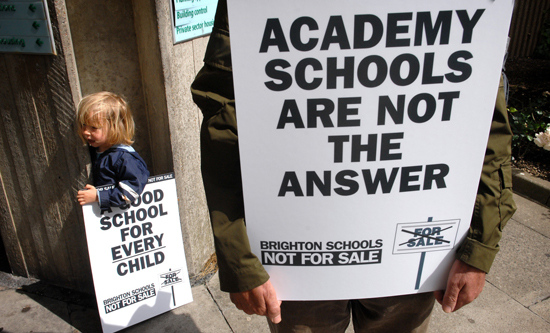The attack on state education, initiated by the Labour Party’s smear on ‘bog standard’ local authority schools in 2001, has led to the massive plunder of public funds under the academies project. The budget of the Department for Education is shrinking in real terms, just like the BHS pension fund, but a stream of cash flows into the pockets of a few. While BHS boss Philip Green’s family received £307m in BHS dividends from 2002 to 2004, the pension fund of 11,000 current and 20,000 future retirees dried up. While school finances freeze, the rip-off merchants help themselves.
Ian Cleland, the chief executive of Academy Transformation Trust, which runs 21 schools in the Midlands and the east of England, receives an annual salary of £180,000 and expenses, which include joint insurance with his wife on a XJ Premier Luxury V6 Jaguar car (plus a £500 service and £402 for new tyres). In March of this year Cleland said the Trust was looking to save £500,000, and staff were required to reapply for their jobs: ‘The education sector is facing a number of significant financial challenges across the country with all schools, academies and multi-academy trusts being affected. As a result it is essential that we review our costs and consider where savings can be made, without impacting on the quality of education.’ (The Observer 24 July 2016)
Huge salaries, personal expenses and ‘related party transactions’ – which means contracting out posts and supplies to family members and friends – are widespread in the management of academy schools. When challenged these expenditures are always justified on the basis of the ‘value added’ by ‘leadership’. So Paradigm Trust pays for its CEO Amanda Phillips to have broadband at her holiday home in France to continue her work, even though she earns £195,354 a year. Stuart Kenning, the chief executive of the Aspirations Academies Trust (AAT), which runs 12 schools, is paid a total package of £225,000, while his wife, Paula Kenning, receives £175,000 as executive principal and founder.
The tangled web of subcontracting, partnerships and joint enterprise that characterises the academy sector means that it is almost impossible to know who is the responsible sponsor of a school without a Freedom of Information request. The similarly named not-for-profit US Aspirations Academy Trust has links to AAT. Its founder, Dr Russell Quaglia receives $8,300 (£6,300) for each of his six visits a year to Britain to cover the cost of hotels, meals and internal travel. Those visits include Quaglia’s provision of ‘top-of-the range’ staff and student surveys to the 12 Aspiration Trust schools charged at $20,000 each a year. The Trust claims that Quaglia’s input is good value because his normal consultancy fees range from $9,600 to $18,000 a day, plus travel costs, whereas ‘the amounts paid directly to Dr Quaglia, in lieu of basic salary, range from $8,000 to $15,000’. He is, says the Trust, ‘a highly respected figure in international education and as he is in high demand around the world we are grateful to his commitment to the Trust’.
The AAT is meanwhile setting up two new schools in London and the south east in 2017 in partnership with Ian Livingstone, described as one of the founders of the UK computer games industry, which will be called ‘Livingstone Academies’.
One thing is certain in this tangled web of sponsorship. The source of all finances is public money that has been allocated to the provision of education for all the children and young people in this country. But while the 4,000 academies collectively hold funds of £2.47bn, this is more than the £2.18bn funds of the 18,700 local authority schools combined. Contrary to deliberately cultivated impressions, multi-academy trusts, ‘free’ schools and faith schools are funded by the state in all essentials. They are supposed to be directly accountable to the Department for Education (DfE) through the Education Funding Agency for costs and expenditure and as open to public scrutiny as Local Education Authorities.
Academy school chiefs and their retinue of cronies who get lavish wages and expenses are financial opportunists. They know that funding must continue to flow to them because the provision of school places for 3-16-year-olds is a statutory obligation on the government.
Secretaries of State for Education come and go, Nicky Morgan yesterday, Justine Greening today, but the DfE ploughs on. The new International Academy of Greenwich is awaiting planning permission before it can move into its permanent home, which is a greenfield site next to a flood plain. Meanwhile the DfE is to spend £271,722 a year on rent to house the school in temporary premises. This kind of situation is being replicated across the country.
In December the DfE paid £33.5m to the property developer Pegasus for an office block in Highbury, north London. This represents a 30% profit for Pegasus which had paid £25.7m for the building nine months earlier. The intention is to open a 1,000 pupil secondary ‘free’ school in an area which already has two well-functioning secondary schools within a five-minute walk of the proposed site. The DfE proposal is not only a wanton waste of its budget but also an act of blatant hostility to the local education authority. This scenario is being carried out the length and breadth of England.
It must be a central demand of Kevin Courtney, the new General Secretary of the National Union of Teachers, to return schooling to the accountability of local education authorities. This will put an end to the DfE’s staggering waste of money which it rolls out endlessly in support of the privileged few.
Susan Davidson
Fight Racism! Fight Imperialism! 252 August/September 2016




